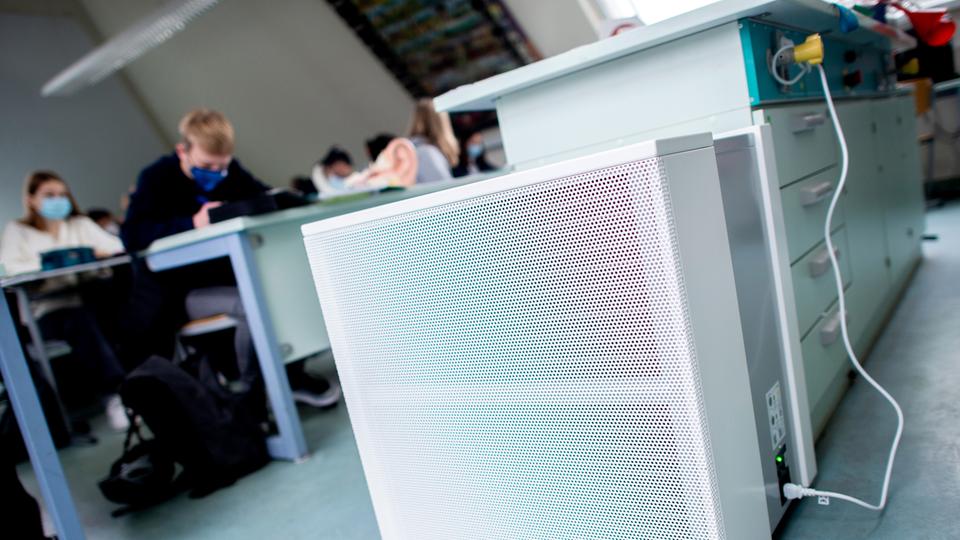
The delta variant could cause schools to close again in autumn. To avoid this, parents, teachers and scientists are calling for air filters to be purchased. The funds are there, but the schools are still lacking. Why?
Schoolchildren have been able to study with their friends again for a few weeks. You don’t even have to wear a mask in the schoolyards. Almost 40 percent of all Hessians have already been vaccinated twice.
But autumn is just around the corner and the delta variant of the coronavirus is spreading rapidly. This is fueling the debate about the use of air filters in classrooms.
The risk of infection increases with the delta variant
Since there is no general vaccination recommendation for children and adolescents by the Standing Vaccination Commission (Stiko), it is feared that a particularly large number of young people will be infected with the Delta variant. There is a threat of new school closings. Many parents, teachers and students do not want that under any circumstances: In their opinion, in addition to masks and tests, air filters must also be used so that they can still learn together after the holidays.
“You always have in the back of your mind that a fourth wave could come, but the air filters make me feel much safer,” says Martin Matthias, a student at the Leibnitz grammar school in Wiesbaden. There are filters in almost every classroom. The money came from town and country, because the high school was a pilot school where the effectiveness of the filters was tested.
“Colorful mix of responsibilities”
But hardly any other school in Hessen is as well equipped as this one. Many would have liked to upgrade a long time ago. For example, school principal Oliver Eissing from the Wolfgang-Ernst-Gymnasium in Büdingen tried out filter systems on his own a few weeks ago. However, the application for acquisition was then rejected. The reason: filter systems must work for all schools of the respective school authority.
“Individual solutions are not possible,” regrets Eissing. “The money is there, the technology is there, the filters are there, there is a lack of implementation,” he adds. “It’s a mixed bag of responsibilities.” Oliver Eissing considers six weeks to equip his school with air filters to be completely unrealistic.
“But by the autumn holidays, all 55 rooms should have an air filter, because the cold season makes ventilation difficult.” Parents and students at the Wolfgang Ernst Gymnasium are still optimistic, but expectations for the time after the summer vacation are high, says Oliver Eissing.
Lorz: “Windows do more than air filters”
Theoretically, there would be financial resources: the state government has provided 75 million euros for hygiene measures in schools. So far, nine million euros of funding has been called for mobile air filter systems. However, the Ministry of Culture does not consider filters to be necessary in every classroom – critics even believe that it would slow down purchases.
“The Federal Environment Agency only recommends filters where ventilation alone does not work; windows are more effective than air filters,” says Minister of Education Alexander Lorz (CDU). “The filters are not the panacea, and there may be more vaccinations available,” he adds. Hessen follows the recommendations of the Federal Environment Agency.
Scientists criticize the approach
Aerosol researcher Gerhard Scheuch cannot understand that. “The newly developed filters remove 90 to 95 percent of viruses from the air,” he says. According to him, ventilation and filtering is better than just ventilation. “The Federal Environment Agency already slowed down important measures last year,” criticized Scheuch.
Parents want to donate
Many parents would even reach into their wallets and help finance the air filters. But this is not possible in every municipality. What is allowed in Frankfurt, Wiesbaden and Offenbach is forbidden in the Schwalm-Eder district and in Gießen. Even if donations are possible in some districts and urban districts, it fails elsewhere, because the school communities are liable for any complications with privately purchased systems.
The chairman of the teachers’ association of Hesse, Jörg Leinberger, criticizes this sharply. “If the school community would like to have the filter systems and also finance itself, it must be possible.”
Every county does it differently
Leinberger sees the problem in the bureaucracy and the distribution of funds. “The districts get the funding, but act independently,” he complains. So decisions are made very differently from district to district and the school communities cannot act independently, they are subordinate to the school authorities. They get their instructions from the district administrator.
Leinberger demands that the decisions should be made centrally in the state government and that the respective school administrators should be given more responsibility. “We have been annoyed about the bureaucracy for years, structural problems become particularly clear in a pandemic. What we need are quick and action-oriented solutions.”
In his opinion, so that the winter of 2020 does not repeat itself and the risk of infection is reduced, bureaucracy must be dismantled and the free time used to equip schools with enough filters.
At a press conference next Monday, Minister of Culture Lorz wants to explain in more detail the measures for a “coron-proof” school operation after the summer holidays.
Ricardo is a renowned author and journalist, known for his exceptional writing on top-news stories. He currently works as a writer at the 247 News Agency, where he is known for his ability to deliver breaking news and insightful analysis on the most pressing issues of the day.











